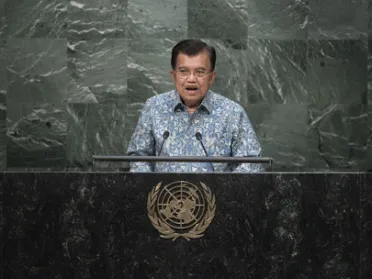Statement
Statement summary
MUHAMMAD JUSUF KALLA, Vice-President of Indonesia, said a success story of the United Nations was its peacekeeping operations, which had kept conflicts at bay around the world. Indonesia was the largest contributor of troops to the Department of Peacekeeping Operations, and stood ready to contribute even more troops if necessary. At present, however, there were still many conflicts raging around the world: the Palestinian people still had no State, and sectarian conflicts such as the one in Syria were unfolding. His country had experience in resolving conflict by peaceful means, he said, noting that August had marked the tenth anniversary of the signing of the Helsinki Memorandum of Understanding on Aceh, which had ended some 30 years of armed conflict. He noted with concern that there was little progress made in the United Nations Disarmament Commission; the world lacked the necessary political will for nuclear disarmament. The international community was also witnessing the worst year in recent history in terms of human migration and refugees. Economic disparity and inequality continued, with more than 800 million people around the world suffering from undernourishment. In many parts of the world, women, children, the elderly, persons with disabilities and other minorities remained marginalized.
On trade, he said there had been no concrete resolve from the Doha Trade Round to support a fair multilateral trading system. Meanwhile, the Ebola crisis had shown the need for more robust health systems worldwide, and youth unemployment was high around the world. “We must work together for rising peace and prosperity for our people,” he said, and it must stop the spread of radicalism and extremism. The Organization also had to be reformed to become more inclusive and transparent. He hoped that the Climate Conference in Paris would result in an agreement to limit global temperature rise to below 2°C. In narrowing global disparities, South-South cooperation was a critical tool. To that end, his country would establish the “Asian Africa Centre” as part of the follow up to the 2015 Asian African Summit. Finally, he said, to guarantee peace and equitable prosperity, the United Nations needed support from each and every Member.
Full statement
Read the full statement, in PDF format.
Photo

Previous sessions
Access the statements from previous sessions.
